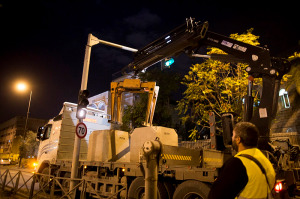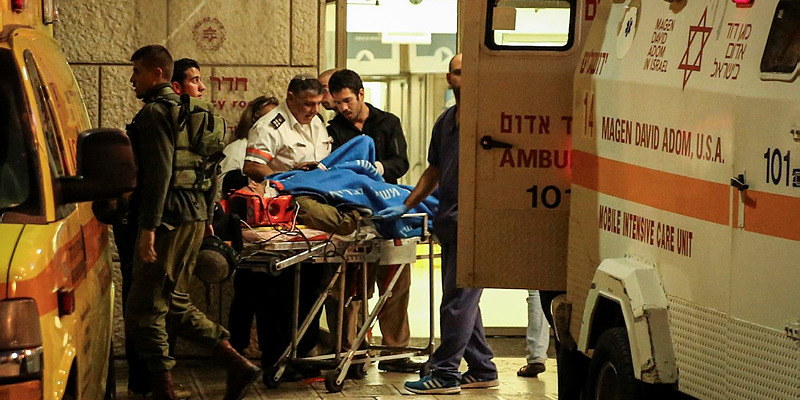With the undeniable spate of terror attacks rocking the Israeli capital, many are asking: Has the third intifada arrived? If so, how should the government respond?
Already in December 2012, prominent Arab-Israeli journalist Khaled Abu Toameh predicted on the Gatestone Institute site:
“By allowing Hamas to celebrate its 25th anniversary in the West Bank, the Palestinian Authority leadership is paving the way for a third intifada against Israel.”
The Battle for Jerusalem
In the past several weeks, the increasing terror attacks against Israeli civilians – culminating with the attempted assassination last week of Rabbi Yehuda Glick, an advocate for equal rights on the Temple Mount, and two car attacks on Wednesday – have reached the point where many are claiming that yes, indeed, this is the third intifada.
Prime Minister Benjamin Netanyahu, while refraining from using the term, stated on Thursday:
“We are in the midst of a battle for Jerusalem, and, in this war, we will win. This [vehicular] attack was the direct result of the incitement of [Palestinian Authority leader] Abbas and his Hamas partners. This front of hate wants to run over all of us. Peace will come when Abbas stops calling Jews ‘defilers’ and he stops embracing murderers.”
Economy Minister Naftali Bennett commented: “Abu Mazen is the driver of the deadly cars in Jerusalem. The terrorists are just his messengers.”
The car attack in Jerusalem on Wednesday morning caused several injuries – some serious – and one death. Another vehicle incident occurred in Gush Etzion – a Jewish neighborhood in Judea not far from Jerusalem – in which three people were hit and one remains fighting for his life. The Israel Security Agency (Shin Bet) has not confirmed whether the latter was a terror attack or an accident.
‘I’m Kind of Surprised that I’m Not Afraid, but I’m Just Not’
Discussion on the street is focused on the question of a third intifada, with many civilians voicing fear of using the light-rail train or even traveling to Jerusalem.
Lenea Markowitz, 25, who made aliyah (immigration to Israel) from America just over a year ago, told United with Israel:
“I’m not afraid. I’m kind of surprised that I’m not afraid, but I’m just not. This is life here and I think [that] by hiding in our homes, we let them win. We can’t let terrorists take over our lives and dictate where we can go.

Economy Minister Naftali Bennett, at a recent Knesset meeting, holds a picture of Adbel-Rahman Shaloudi, who drove his car into a train station and killed a woman and an infant. (Photo: Yonatan Sindel/Flash90)
“I wish the world heard about these incidents more,” she added, referring to what she sees as a lack of international coverage of attacks on Israelis. “I think it’s a shame that they only hear about it when Israel has to defend itself from these attacks, and then we are painted in a bad way when all we are trying to do is stop innocent people from being killed. Also, it makes me sick that the family of these terrorists are applauding them and are saying they are proud of them. The Jewish people would never applaud killing civilians – not ever. My heart and prayers go out to the families who have lost their loved ones and to those who are fighting for their lives right now. I hope these disgusting acts stop.”
Paula Stern – a technical writer, blogger and mother of an IDF soldier – lives in Maalei Adumim, a small city in Judea just seven km. (4.3 miles) outside the capital. She works several days a week in central Jerusalem.
“I’m not afraid,” she told UWI. “I’m sad. I’m angry…. ‘Afraid’ isn’t one of the words I would use to describe it.”
However, she acknowledges, “some people are afraid.” On her way home on the train Wednesday evening, she noticed that there were “fewer people and a lot fewer Arabs. Both last night and this [Thursday] morning I’ve been a little more apprehensive, but it’s more of a sad, uncomfortable feeling. Not fear.”
“I think it is absolutely the third intifada and it’s time we accepted it,” she stated. “The people have [accepted it], but the government has not said so…. For a long time the Arabs have threatened it; they like the idea of threatening. The government should declare it and end it. I don’t think we’re there yet.”
Concrete Blocks a ‘Reward to Terrorism’
Referring to the concrete blocks erected at the train stations Wednesday evening in light of the heightened terror, police are clearly “anticipating cars coming down and looking to see how a car could fit through the polls to hit people,” she said.
“The concrete barriers at the light rail are a reward to terrorism,” Bennett stated. “The solution to terrorism is not to put Jews behind fences and barriers, but to deter the murderers….
“Just so we are clear, these concrete blocks will be destroyed or defiled [by terrorists]. They will not help. That is not how one fights terrorism. That is how one encourages it.”

Train workers place concrete blocks at a station on Wednesday to protect users from car terror. (Photo: Yonatan Sindel/FLASH90)
According to Bennett, “Israel is defending itself to death. The solution is deterrence, not defensive measures. The solution is not the Iron Dome concept, but an iron fist. We did this during Operation Defensive Shield in Judea and Samaria, and the terrorism ceased. We can do this today in Jerusalem.
“It takes courage, and a decision needs to be made,” he declared.
Rabbi David Bar-Hayim of Machon Shilo, a center for Torah study in Jerusalem, on Thursday placed the blame on the current leadership, saying that the situation in Jerusalem and the rise of anti-Semitic incidents around the world “can and must be traced to the immoral, irrational, and extremely unwise decision…to release over 1,000 Hamas terrorists in exchange for the release of the Israeli soldier, Gilad Shalit who was held in captivity by Hamas.
“The security situation prior to that immoral deal was very quiet,” Bar-Hayim stated. “The statistics are plain. Ever since that time there has been a steady increase in all manner of violent attacks against Jews throughout the country.”
Police Commissioner Insp.-Gen. Yohanan Danino said that the recent terror attacks in Jerusalem do not point to a new intifada.
“There is no need to scare the public,” Danino asserted.
Worst Spate of Violence in over a Decade
Jerusalem Post Managing Editor David Brinn wrote in an opinion piece on Thursday:
“Whether the third intifada or a new spin-off, Jerusalem is in the throes of the worst spate of Arab violence against Jewish residents in over a decade. Anyone who lived here through the first and second intifadas will recognize the same jittery, nervous spirit in the streets. It used to be unsafe to board a bus; now it’s unsafe to stand at a bus stop or light rail station. Pedestrians look suspiciously out of the corner of their eyes as they walk on the street. They are no longer isolated incidents.”
“The third intifada is apparently here, despite Israel Police Insp.-Gen. Yohanan Danino’s statement to the contrary Wednesday, spoken only an hour or so after the surviving victims of the van attack were whisked away to the hospital,” Brinn wrote.
According to Stern, “Until we accept it, we can’t end it. We need to admit it, recognize it and then end it.”
Author: Atara Beck
Senior Writer, United with Israel
Add your voice below. What do you think? Is this another intifada?
Send Passover Packages to Needy Israeli Soldiers - Bring Them Joy!
We are honored to thank the young men and women of the IDF who risk their lives every day to protect the citizens of Israel. Since October 7th, soldiers have been on the battlefield for months - many are hoping to come home for Passover.
Join us in sending Passover food packages (and personal notes) to Israeli soldiers and their families.
Many soldiers spend the Passover holiday with needy families back home. The soldiers greatly appreciate your love and concern. Bring them Passover joy!
CLICK HERE TO SEND YOUR PACKAGE AND NOTE TO ISRAELI SOLDIERS!




